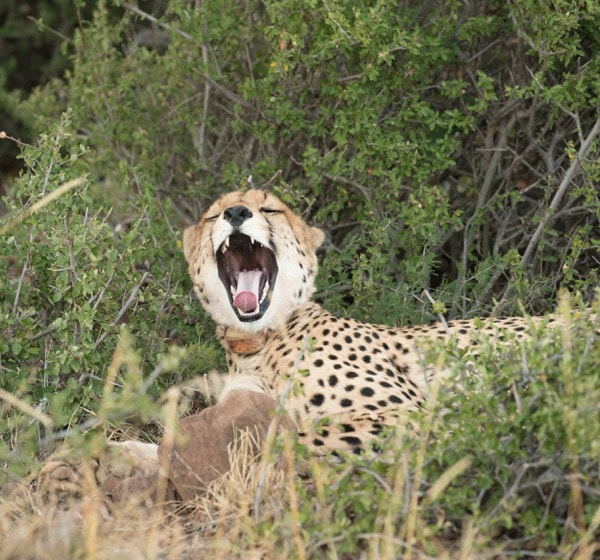On the 4th and 5th September, we visited the resort at the request of the new owner, Searl Derman, in order to assess the existing Cheetah program and to advise on any changes needed to comply with fair trade tourism guidelines.
Inverdoorn is a big five upmarket resort in the Tankwa Karoo near Sutherland. The lodge sits on a vast expanse of flat Karoo veld, 10,000 ha in all. The attempted poaching of one of their rhino some years ago featured in Richard Peirce’s book Poachers Moon.
About ten minutes drive away from the town of Touws Rivier lies Aquila private game reserve which is a successful ecotourism resort built up by Searl from scratch over the last 21 years. Aquila is the busiest private game reserve in Africa. A large number of tourists visit every year and it provides employment for around 500 staff.
Searl has bought Inverdoorn for a number of reasons. It is not far away from his main business (Aquila) and it fits with a business plan to offer a more remote and more exclusive five-star resort as part of a package tour.
The ethics committee
However he was concerned that the existing cheetah program might be seen as unethical and could damage his reputation so he contacted me and I suggested that he set up a completely independent ethics committee to advise him and to deal with any complaints about ethics, leaving him free to focus on business, while knowing that the welfare of the animals is not being compromised.
Toni Brockhoven of Beauty Without Cruelty in Cape Town, and wildlife documentary author and activist Richard Peirce have kindly agreed to join me to form the committee.
The cheetah program
We had a good look at the existing cheetah program. There are 15 animals in captivity. They are cared for by an experienced and dedicated handler. There is an excellent quality of life enhancement program which ensures that they remain in good condition. There are no volunteers; all the Cheetah staff are full time employees.
Every evening at 5 o’clock, as part of their exercise regimen and for rehabilitation purposes , a number of cheetah have to run for their supper, chasing a lure down a runway at up to 120 km an hour. At the end of the run they are rewarded with their food. There is no interaction with tourists who merely observe from a vantage point on top of a building halfway along the run. This ritual happens every evening regardless of whether there are tourists there to observe.
The holding camps are spacious and clean. On a daily basis in the mornings, cheetah are taken out into the veld in the reserve where they are allowed to run free and do whatever they want, chase after prey or lie under trees, depending on their mood. There are no ethical reasons why tourists should not accompany the habituated cheetah on these walks through the bush.
The same thing happens at Samara game reserve near Graaf Reinet where the famous cheetah Sybella was quite happy to allow tourists to sit a little distance away from her and to accompany her at some distance while she went about her daily tasks as a wild self-sustaining animal.
What worried Searl was that some tourists have been allowed in the past to touch the cheetah on these occasions, although under very strict control by the handler, who would only allow touching when the animals were relaxed and purring and not at all if she felt that the animal was not in the mood.
Unfortunately, the very word ‘touching’ conjures up unacceptable images of lion cubs being passed around clumsy tourists in order to externalise the cost of rearing them to canned huntable size.
However the modern view - and the ethics of animal welfare are still evolving - is that any form of touching should not be allowed and we advised the staff. Searl had already stopped any touching. Toni of Beauty Without Cruelty confirms that no physical interaction from the public must take place, regardless. Inverdoon has already alerted the previously- booked patrons that no direct animal interaction will take place as previously advertised, but that tourists will enjoy an educational cheetah tour which includes watching them run. Visitors are also taken in a safari vehicle to see the cheetah being prepared for their life back in the wild.
Speaking personally my concern is less for animal ethics as a dogma and far more on whether the animals are content and well cared for.
And I must say that the Inverdoorn cheetah are probably the luckiest captive cheetah in South Africa in terms of condition, care, contentment, and quality of life enhancement programs. These animals will never be hunted.
Searl has already decided that he will predator- fence up to 5000 hectares into which he will import a suitable prey base such as springbok, blesbok and ostrich. Then a family of his captive Cheetah will be released to live wild and free.

